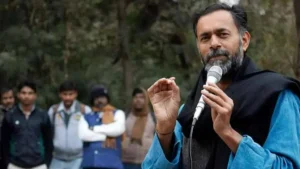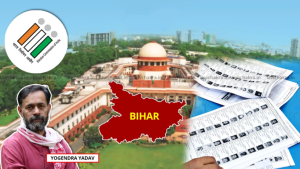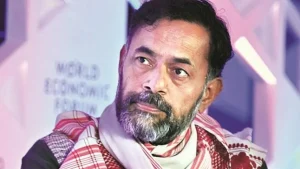New Delhi – In a dramatic Supreme Court hearing, political activist Yogendra Yadav presented two individuals who have been officially declared dead by the Election Commission during Bihar’s Special Intensive Revision (SIR) of electoral rolls. The unprecedented courtroom presentation by Yogendra Yadav aimed to demonstrate fundamental flaws in the electoral revision process and expose alleged systematic disenfranchisement of legitimate voters.
Yogendra Yadav addressed the bench of Justices Surya Kant and Joymalya Bagchi directly, bringing the allegedly deceased voters into the courtroom to prove their living status. This theatrical yet substantive demonstration highlighted serious concerns about the accuracy and fairness of the ongoing electoral revision process in poll-bound Bihar.
Courtroom Drama and Living Proof

“Please see them. These are declared as dead. They don’t appear. But they are alive…see them,” Yogendra Yadav told the court during the hearing of petitions challenging the Bihar SIR process. This direct appeal to the judges emphasized the tangible impact of administrative errors on individual voting rights and democratic participation.
The courtroom presentation by Yogendra Yadav created an unprecedented situation where abstract legal arguments about electoral processes became concrete through the physical presence of affected individuals. This approach demonstrated the activist’s commitment to providing irrefutable evidence of systemic problems within the revision process.
Election Commission’s Response and Judicial Observations


Senior Advocate Rakesh Dwivedi, representing the Election Commission of India, dismissed Yogendra Yadav’s presentation as mere “drama,” suggesting that the cases represented isolated incidents rather than systematic problems. This response reflected the Election Commission’s stance that such errors are aberrations rather than indicative of broader issues.
Justice Bagchi acknowledged that the situations presented by Yogendra Yadav might represent inadvertent errors that could be corrected, while noting that the activist’s points were well taken. The judicial response balanced recognition of legitimate concerns with understanding of administrative complexities inherent in large-scale electoral revision processes.
Also Read: Vote Purchase Allegations Shock Karnataka: BJP MP Demands Probe Into Siddaramaiah’s 2018 Win
Mass Exclusion Allegations and Statistical Evidence


Yogendra Yadav argued that the SIR process, by design, was leading to mass exclusion of legitimate voters rather than simple administrative revision. He claimed that “vast exclusion has already begun” and that the actual number of excluded voters exceeds 6.5 million, representing a significant threat to democratic participation in Bihar.
The activist emphasized that exclusion numbers far exceed official estimates, stating that “exclusion is much more than 65 lakhs.” Yogendra Yadav characterized this as an inherent feature of the SIR process rather than implementation failure, suggesting systematic rather than accidental disenfranchisement.
Historical Precedent and Process Criticism
Yogendra Yadav challenged the legitimacy of requiring citizens to submit forms during revision exercises, arguing that such requirements have never been imposed in the country’s electoral history. He demanded that Election Commission representatives provide evidence of similar form submission requirements from previous revision exercises, particularly referencing the 2003 revision.
The activist’s historical analysis suggested that the current Bihar SIR represents an unprecedented departure from established electoral revision procedures. Yogendra Yadav characterized the process as “intensive deletion” rather than legitimate revision, implying deliberate voter suppression rather than administrative updating.
Gender-Based Exclusion Patterns
Yogendra Yadav presented disturbing evidence of gender-based disparities in voter exclusion, revealing that 3.1 million women had been deleted compared to 2.5 million men. This statistical evidence suggests that the SIR process may disproportionately impact female voters, raising additional concerns about electoral fairness and gender equality in democratic participation.
The gender disparity highlighted by Yogendra Yadav adds another dimension to the controversy, suggesting that the electoral revision process may inadvertently or deliberately target specific demographic groups. This pattern raises serious questions about the neutrality and fairness of administrative procedures.
Supreme Court’s Trust Deficit Assessment


The Supreme Court characterized the Bihar SIR controversy as “largely a trust deficit issue” during proceedings, acknowledging the fundamental breakdown in confidence between electoral authorities and citizens. Justice Surya Kant noted that if 7.24 crore voters out of 7.9 crore responded to the SIR, it challenges theories about massive disenfranchisement.
However, Yogendra Yadav’s evidence of living individuals declared dead complicates this assessment, suggesting that response rates may not accurately reflect the actual impact on legitimate voters. The courtroom presentation provided concrete evidence contradicting official statistics and administrative claims.
Projected Scale and Future Implications
Yogendra Yadav warned that the exclusion figure is “bound to cross 1 crore,” representing what he termed “the largest exercise of disenfranchisement” in the country’s history. This projection suggests that the current Bihar SIR could fundamentally alter the democratic landscape by excluding millions of legitimate voters from participation.


The activist’s characterization of the process as “dreadful” reflects deep concerns about the long-term implications for democratic governance and electoral integrity. Yogendra Yadav’s warnings suggest that the Bihar case could establish dangerous precedents for future electoral revisions across other states.
Continuing Legal Proceedings
Justice Kant thanked Yogendra Yadav for his assistance and analysis at the conclusion of Tuesday’s hearing, acknowledging the value of his evidence and arguments in understanding the complexities of the Bihar SIR controversy. The hearing is scheduled to continue on Wednesday, suggesting that the court requires additional time to thoroughly examine all evidence and arguments.
The ongoing legal proceedings indicate that Yogendra Yadav’s dramatic presentation has successfully focused judicial attention on the fundamental issues surrounding electoral revision processes and their impact on democratic participation in Bihar.

